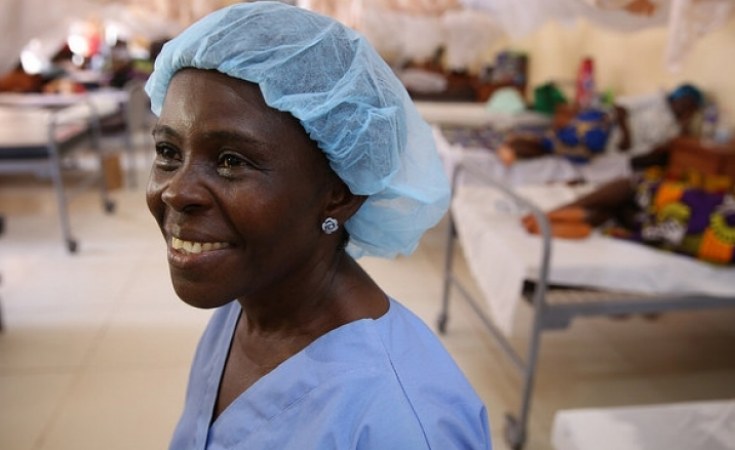Monrovia — Ebola hit close to home – hard – as it reached its peak in 2014. Two members of my church - one a nun and the other a social worker who had been under 21-day quarantine and observation - both died.
My cousin Enid, an emergency nurse with the health ministry, was under surveillance as well, after coming into contact with an Ebola patient. She was assigned to Kakata, a densely populated trading town in Margibi County, where several health workers had already died and health facilities didn't have enough personal protective supplies. Our family was worried about her.
She, too, died. On her Facebook page a few weeks earlier, she posted, "Ebola has hit Margibi again. More health workers are being affected this round 2 and some are even dying. Oh God have mercy." Our family and friends will remember that she caught the virus trying to save others. Rest In Peace, Enid.
But personal losses didn't stop Liberians from trying to help ourselves and each other. Whatever you heard about the situation, you should know that people may have been frightened, but most of us worked hard to stop the virus.
Ebola became a household word. When the first case was reported in the northern Lofa area in late March, the chief medical officer, Dr. Bernice Dahn, warned that "the disease is reported to be spreading along the border" Liberia shares with Guinea and Sierra Leone.
Almost every Liberian citizen soon knew what Ebola was. Many understood that the virus was real and took preventive measures, while others were in denial. But people who denyed the existence of the Ebola virus in the country still followed the preventive measures, which baffled me.
"I don't understand some Liberians", said one of my friends, Derek Berlic. When I asked him why, he said, "Some people go around saying that the virus isn't real, but yet still they join us and wash their hands and use sanitizers as frequently as those of us that believe that the virus is real." He said it pleased him when he saw these individuals taking preventive measures, because it signaled that somewhere in these people minds, they believed the virus was real, even if they didn't want to admit it.
Most churches joined the fight against Ebola by carrying on awareness campaigns, talking about it during sermons and placing buckets of water at entrances of the church buildings for members to wash their hands before entering for service. Both Christian and Muslim religious leaders called on all Liberians to pray for the country – and, at the same time, to take their own preventive measures.
Supermarkets, shops and other business centers followed suit. The three mobile phone companies in Liberia used SMS to sensitive their subscribers by sending daily text messages about the virus. Across cities and towns, Liberians organized themselves in various communities to promote awareness.
It seemed that almost every Liberian became his or her 'brother's keeper' by carrying on sensitization in taxis, clubs, and market places - wherever they found themselves. On Facebook, many Liberians made their profile pictures Ebola related and their statuses featured awareness messages on a daily basis. Liberian groups on Facebook discussed the situation.
Liberians in the diaspora organized themselves into mini-groups to send aid, such as gloves and other personal protective equipment, back home to fight this deadly disease. The Liberian ambassador in Washington DC, Jeremiah Sulunteh, announced that the embassy had established an account for those who wanted to donate.
The alarmingly high death rate from the Ebola virus among health workers left citizens wondering how they would get medical care for many common illnesses, which can be deadly also, such as malaria. Bodies of suspected Ebola victims being left in the streets or in houses added to the anxiety.
In this situation, it was hard to prevent suspicion and misinformation. There were stories of some individuals going around putting dangerous chemicals such as formaldehyde in wells in various communities. The result was that Liberians had to worry about poisonous chemicals being put into water sources as well as about the Ebola virus; but Police Director Col. Chris Massaqoui denounced the rumor. He said the police found no evidence that the stories were true.
The president of Liberia, Madam Ellen Johnson Sirleaf, addressed the nation multiple times, including announcing a state of emergency. She said, "Under the State of Emergency, the Government will institute extraordinary measures, including, if need be, the suspension of certain rights and privileges."
The government passed a regulation for only three persons to sit in the back of a taxi to avoid close contact, but even at that, one couldn't possibly avoid touching or rubbing against other passengers. On a daily basis, securing transport in Monrovia is a rush-and-fighting thing, which involves considerable contact with other people who are also trying to get a taxi or bus. In my case, the trip to work usually took two different commercial vehicles. So movement from place to place became worrisome. Still, people had no choice but to do it.
But there were positive things every Liberian could do. So this is how I spent my time. With my organization Girls As Partners, in one weekend I managed to reach out to ten different churches in the Gardnersville area of Monrovia, giving them buckets, chlorine and soap so their members could adhere to one of the Ebola preventive measures – washing hands. We also gave out leaflets containing facts about Ebola and its prevention.
During the rainy season, we had to walk through small rivers to get to some churches, but it was really fun reaching out to others. Would you believe someone was brave enough to ask me whether I had a political motive for doing this? Nevertheless, I said let's all be our brothers' and sisters' keepers and kick Ebola out of Liberia.


